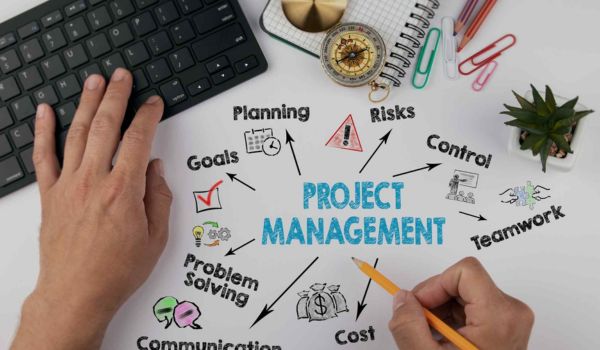In the ever-evolving world of project management, staying ahead of the curve is crucial for success. As we step into 2024, several emerging trends are poised to reshape the landscape of project management. This article delves into these trends, offering a comprehensive look at what lies ahead for project managers and organizations alike.
1. Agile and Hybrid Methodologies: The New Norm
Agile methodologies have been a game-changer in project management, and their influence continues to grow. In 2024, we are witnessing a significant shift towards hybrid methodologies that blend Agile with traditional Waterfall approaches. This hybrid approach allows for greater flexibility, enabling teams to adapt to changing project requirements while maintaining a structured framework.
Benefits of Agile and Hybrid Methodologies
- Flexibility: Agile allows teams to respond quickly to changes, ensuring that project goals remain aligned with business objectives.
- Improved Collaboration: Agile fosters a collaborative environment, encouraging communication and cooperation among team members.
- Enhanced Customer Satisfaction: By delivering incremental updates, Agile ensures that customer feedback is incorporated continuously, leading to higher satisfaction.
2. Increased Adoption of AI and Automation
Artificial Intelligence (AI) and automation are revolutionizing project management by streamlining processes and enhancing decision-making. In 2024, we see a surge in the adoption of AI-driven tools that assist project managers in various tasks, from risk assessment to resource allocation.
Key AI and Automation Tools
- AI-Powered Project Management Software: These tools leverage machine learning algorithms to predict project outcomes, optimize schedules, and identify potential risks.
- Robotic Process Automation (RPA): RPA automates repetitive tasks, freeing up project managers to focus on strategic activities.
- Chatbots: AI-driven chatbots provide real-time assistance to team members, answering queries and facilitating communication.
3. Emphasis on Soft Skills
While technical skills are essential, the importance of soft skills in project management cannot be overstated. In 2024, organizations are placing greater emphasis on developing skills such as leadership, communication, and emotional intelligence.
- Crucial Soft Skills for Project Managers Leadership: Effective project managers inspire and motivate their teams, driving them towards achieving project goals.
- Communication: Clear and concise communication ensures that all stakeholders are on the same page, reducing misunderstandings and conflicts.
- Emotional Intelligence: Understanding and managing emotions, both one’s own and others, leads to better team dynamics and conflict resolution.
4. Remote and Hybrid Work Models
The COVID-19 pandemic accelerated the adoption of remote work, and in 2024, remote and hybrid work models have become the norm. Project managers must adapt to these models, ensuring that productivity and collaboration are maintained.
Strategies for Managing Remote Teams
- Leveraging Technology: Utilize collaboration tools such as Slack, Microsoft Teams, and Zoom to facilitate communication and teamwork.
- Establishing Clear Guidelines: Set clear expectations for remote work, including communication protocols and project milestones.
- Fostering a Strong Team Culture: Encourage virtual team-building activities and regular check-ins to maintain team cohesion and morale.
5. Sustainability and Green Project Management
As environmental concerns continue to rise, sustainability has become a key focus in project management. In 2024, organizations are increasingly integrating green project management practices to minimize their environmental impact.
Implementing Green Project Management
- Sustainable Resource Management: Optimize resource usage to reduce waste and promote sustainability.
- Eco-Friendly Project Practices: Incorporate eco-friendly practices such as using renewable energy sources and minimizing carbon footprints.
- Stakeholder Engagement: Engage stakeholders in sustainability initiatives, ensuring that environmental considerations are integrated into project planning and execution.
6. Data-Driven Decision Making
Data analytics is playing an increasingly pivotal role in project management. In 2024, project managers are leveraging data to make informed decisions, predict trends, and improve project outcomes.
Utilizing Data Analytics in Project Management
- Predictive Analytics: Use historical data to forecast project risks, timelines, and budget requirements.
- Real-Time Monitoring: Implement real-time data tracking to monitor project progress and make timely adjustments.
- Performance Metrics: Establish key performance indicators (KPIs) to measure project success and identify areas for improvement.
7. Focus on Diversity and Inclusion
Diversity and inclusion are no longer just buzzwords; they are essential components of successful project management. In 2024, organizations are prioritizing diverse and inclusive teams to drive innovation and achieve better project outcomes.
Promoting Diversity and Inclusion in Project Management
- Inclusive Leadership: Foster an inclusive leadership style that values diverse perspectives and encourages open dialogue.
- Diverse Teams: Assemble project teams with diverse backgrounds, skills, and experiences to enhance creativity and problem-solving.
- Training and Awareness: Implement training programs to raise awareness about the importance of diversity and inclusion in project management.
8. Enhanced Focus on Cybersecurity
With the increasing reliance on digital tools and remote work, cybersecurity has become a critical concern in project management. In 2024, project managers must prioritize cybersecurity measures to protect sensitive data and ensure project integrity.
Cybersecurity Best Practices for Project Managers
- Risk Assessment: Conduct regular cybersecurity risk assessments to identify vulnerabilities and mitigate risks.
- Secure Communication Channels: Use encrypted communication tools to safeguard sensitive information.
- Employee Training: Provide training to team members on cybersecurity best practices and the importance of data protection.
9. Integration of Blockchain Technology
Blockchain technology is making its way into project management, offering new ways to enhance transparency and accountability. In 2024, we see an increasing number of organizations exploring the potential of blockchain in project management.
Applications of Blockchain in Project Management
- Smart Contracts: Use smart contracts to automate and enforce project agreements, ensuring transparency and reducing the risk of disputes.
- Secure Data Sharing: Leverage blockchain for secure and immutable data sharing among project stakeholders.
- Traceability: Utilize blockchain to track project deliverables and ensure accountability throughout the project lifecycle.
10. Continuous Learning and Development
The rapidly changing project management landscape requires continuous learning and development. In 2024, organizations are investing in training and development programs to equip project managers with the latest skills and knowledge.
Continuous Learning Strategies
- Professional Development Programs: Encourage project managers to participate in certification courses and workshops to stay updated with industry trends.
- Mentorship and Coaching: Implement mentorship programs to provide project managers with guidance and support from experienced professionals.
- Knowledge Sharing: Foster a culture of knowledge sharing within the organization to promote continuous learning and growth.
As we navigate through 2024, these emerging trends in project management are set to transform the way we approach and execute projects. By embracing these trends, organizations can enhance their project management practices, drive innovation, and achieve greater success.




